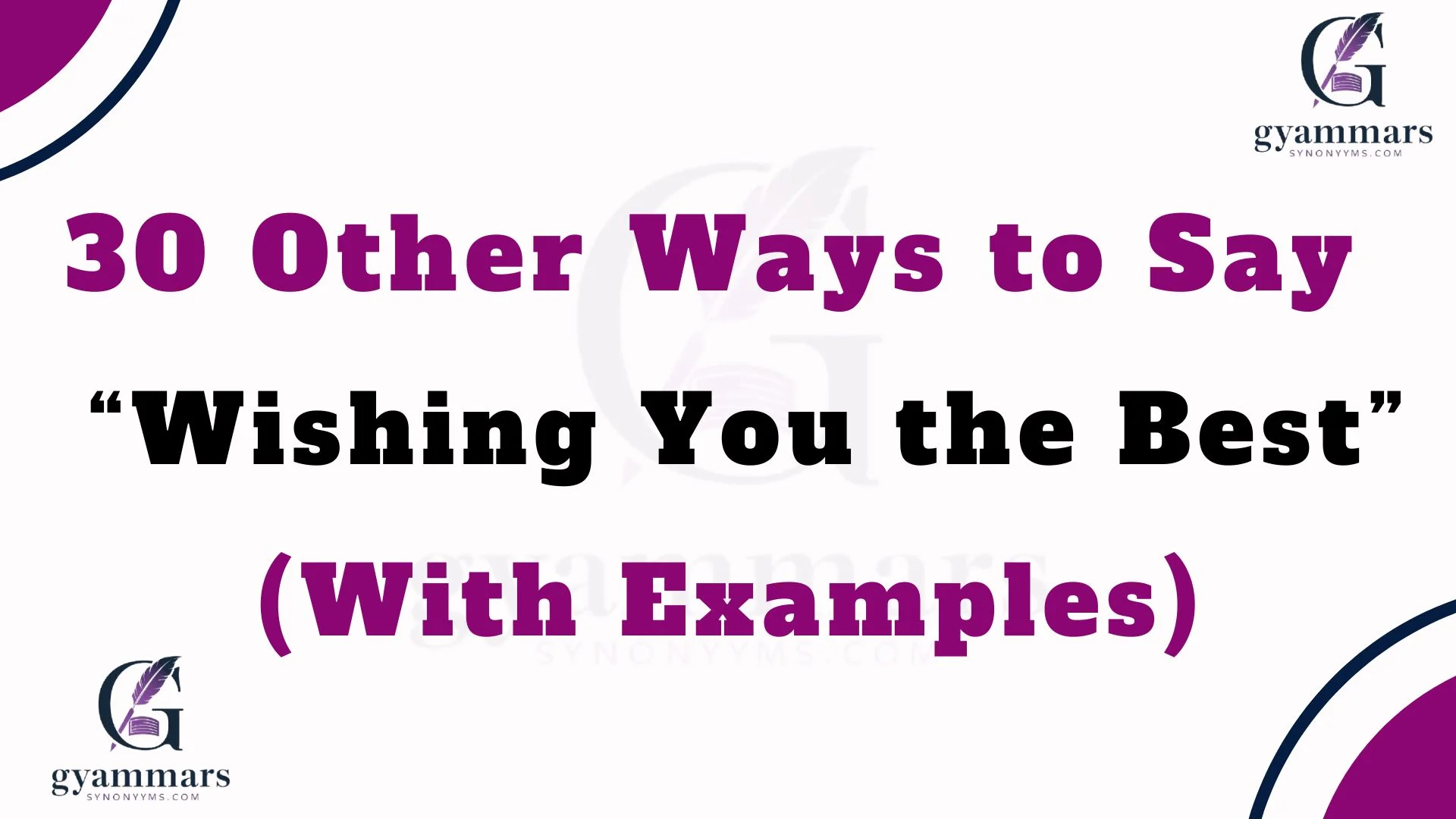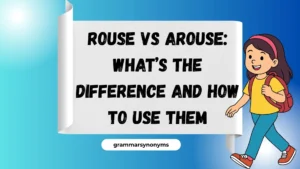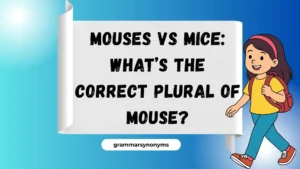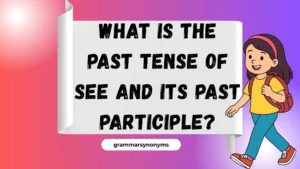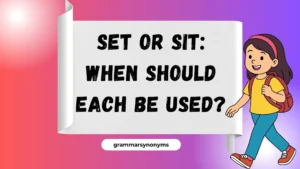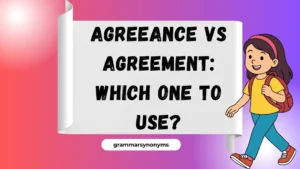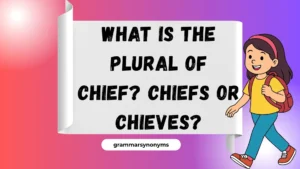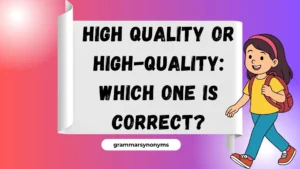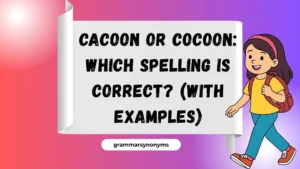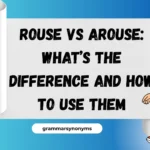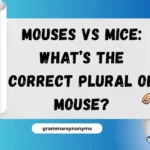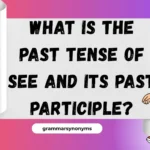Finding the right words to express care, encouragement, and positivity can make all the difference in how your message is received. While the phrase “Wishing you the best” is polite and kind, sometimes you may want to say it differently to sound warmer, more personal, or more professional. This article will walk you through 30 thoughtful alternatives, complete with meanings, examples, and usage tips, so you can choose the phrase that best fits your situation.
What Does “Wishing You the Best” Mean?
The phrase “Wishing you the best” is a way of expressing kindness, encouragement, and goodwill. It communicates support and positivity toward someone’s future, whether that’s for their personal journey, career, health, or life in general.
Is It Professional/Polite to Say “Wishing You the Best”?
Yes! The phrase is both professional and polite. You can use it in emails, cards, workplace messages, or personal conversations. However, because it’s a very common expression, sometimes it can sound a little generic. That’s why having alternatives gives your words a fresh, thoughtful touch.
Pros or Cons of Saying “Wishing You the Best”
Pros:
- Universally positive and polite.
- Works in both personal and professional settings.
- Quick and simple to use.
Cons:
- Can feel overused or generic.
- Lacks personalization if repeated often.
- Sometimes doesn’t reflect deeper emotion or specificity.
Synonyms For “Wishing You the Best”
- All the Best
- Best of Luck
- Warm Regards
- Best Wishes
- Take Care
- Sending Positive Vibes
- Stay Well
- Much Success
- Take It Easy
- Here’s to Your Success
- Cheers to You
- Good Luck with Everything
- All the Happiness to You
- Many Blessings
- Godspeed
- Good Fortune
- May You Prosper
- Enjoy the Journey
- Keep Shining
- You’ve Got This
- Success Awaits You
- May Joy Follow You
- Congratulations and Beyond
- Keep Moving Forward
- May Your Dreams Come True
- Rooting for You
- May Life Treat You Kindly
- Go Get ’Em
- May Your Path Be Bright
- Here’s Hoping for the Best
1. All the Best
Definition: A friendly way of offering support and positivity.
Detailed Explanation: Often used in casual or professional settings, it’s shorter and more conversational.
Scenario Example: “Congratulations on your new role—all the best in this exciting chapter!”
Best Use: Ideal for professional emails or casual notes.
Tone: Warm, simple, and polite.
Additional Notes: More versatile than “wishing you the best.”
2. Best of Luck
Definition: A classic way to wish success in a specific endeavor.
Detailed Explanation: Often used before events, exams, or new jobs.
Scenario Example: “You’ve prepared so well—best of luck with your presentation today.”
Best Use: Encouraging someone before a task.
Tone: Supportive and motivating.
Additional Notes: Best suited for goal-related situations.
3. Warm Regards
Definition: A polite and professional closing.
Detailed Explanation: Perfect for emails when you want to sound both respectful and kind.
Scenario Example: “Thank you for your help—warm regards, Sarah.”
Best Use: Professional communication.
Tone: Respectful yet friendly.
Additional Notes: Slightly more formal than “best wishes.”
4. Best Wishes
Definition: A timeless way to express goodwill.
Detailed Explanation: Works in nearly all personal and professional contexts.
Scenario Example: “Wishing you happiness on your big day—best wishes!”
Best Use: Weddings, celebrations, or professional notes.
Tone: Polite, thoughtful, and adaptable.
Additional Notes: Often used in cards.
5. Take Care
Definition: A caring phrase for someone’s well-being.
Detailed Explanation: Often used in both casual and heartfelt settings.
Scenario Example: “Drive safe and take care on your trip.”
Best Use: Informal or personal settings.
Tone: Warm and protective.
Additional Notes: Shows genuine concern.
6. Sending Positive Vibes
Definition: A modern, uplifting phrase.
Detailed Explanation: Conveys encouragement and positivity in casual contexts.
Scenario Example: “You’ve got this—sending positive vibes your way!”
Best Use: Supportive notes, social media, or messages.
Tone: Cheerful and friendly.
Additional Notes: Informal and uplifting.
7. Stay Well
Definition: A phrase for wishing health and peace.
Detailed Explanation: Often used in letters or emails as a polite close.
Scenario Example: “Thank you again for your help. Stay well.”
Best Use: Professional and health-conscious settings.
Tone: Calm, kind, and considerate.
Additional Notes: Appropriate for wellness-related contexts.
8. Much Success
Definition: A direct wish for someone’s achievement.
Detailed Explanation: Best used when focusing on goals or careers.
Scenario Example: “Wishing you much success in your new role.”
Best Use: Professional settings.
Tone: Respectful and goal-focused.
Additional Notes: Stronger than just “good luck.”
9. Take It Easy
Definition: Encouragement to relax and not stress.
Detailed Explanation: Informal and casual in nature.
Scenario Example: “You’ve worked hard all week—take it easy this weekend.”
Best Use: Friends or casual notes.
Tone: Relaxed, friendly.
Additional Notes: Not suitable for formal settings.
10. Here’s to Your Success
Definition: A celebratory phrase of encouragement.
Detailed Explanation: Sounds like a toast, often used in congratulations.
Scenario Example: “Here’s to your success in your new venture!”
Best Use: Celebrations or formal events.
Tone: Uplifting, supportive.
Additional Notes: More ceremonial.
11. Cheers to You
Definition: A positive and cheerful closing.
Detailed Explanation: Good for celebrating achievements or sending well-wishes.
Scenario Example: “Cheers to you on this exciting milestone!”
Best Use: Celebratory moments.
Tone: Fun, upbeat, and joyful.
Additional Notes: Often used in social gatherings.
12. Good Luck with Everything
Definition: A broad expression of goodwill.
Detailed Explanation: Covers multiple areas of life.
Scenario Example: “I hope things go smoothly—good luck with everything.”
Best Use: General encouragement.
Tone: Warm and supportive.
Additional Notes: Versatile for many contexts.
13. All the Happiness to You
Definition: A heartfelt wish for joy.
Detailed Explanation: Often used in cards or heartfelt notes.
Scenario Example: “May your journey be filled with love—all the happiness to you.”
Best Use: Personal notes or big life events.
Tone: Warm, emotional.
Additional Notes: Strongly personal tone.
14. Many Blessings
Definition: A spiritual or heartfelt phrase.
Detailed Explanation: Often used in faith-based or supportive contexts.
Scenario Example: “Sending many blessings to you and your family.”
Best Use: Spiritual or personal contexts.
Tone: Warm, caring, spiritual.
Additional Notes: Works in faith-oriented communities.
15. Godspeed
Definition: A traditional wish for safe travels.
Detailed Explanation: Often used when someone is embarking on a journey.
Scenario Example: “Safe travels and godspeed on your new adventure.”
Best Use: Journeys, moves, or new beginnings.
Tone: Formal, old-fashioned, respectful.
Additional Notes: Still meaningful in formal contexts.
16. Good Fortune
Definition: A hopeful wish for luck and success.
Detailed Explanation: Slightly more formal than “good luck.”
Scenario Example: “Wishing you good fortune in your new business.”
Best Use: Professional and ceremonial settings.
Tone: Respectful, positive.
Additional Notes: Elegant phrasing.
17. May You Prosper
Definition: A wish for growth and success.
Detailed Explanation: Suggests both material and personal prosperity.
Scenario Example: “May you prosper in your new venture.”
Best Use: Formal events, professional wishes.
Tone: Strong, uplifting, formal.
Additional Notes: Sounds inspiring.
18. Enjoy the Journey
Definition: A reminder to value the process, not just the outcome.
Detailed Explanation: Encourages mindfulness and positivity.
Scenario Example: “No matter the outcome, enjoy the journey.”
Best Use: Supportive messages.
Tone: Reflective, kind.
Additional Notes: Great for life transitions.
19. Keep Shining
Definition: A motivational phrase to continue thriving.
Detailed Explanation: Acknowledges someone’s strengths.
Scenario Example: “You’re doing amazing—keep shining.”
Best Use: Encouragement for friends or peers.
Tone: Uplifting, motivating.
Additional Notes: Casual but very supportive.
20. You’ve Got This
Definition: A direct confidence booster.
Detailed Explanation: Commonly used before challenges.
Scenario Example: “Don’t worry about the test—you’ve got this.”
Best Use: Motivation before tasks.
Tone: Encouraging and supportive.
Additional Notes: Casual and reassuring.
21. Success Awaits You
Definition: A forward-looking phrase.
Detailed Explanation: Implies that success is inevitable.
Scenario Example: “Success awaits you in your new role.”
Best Use: Professional encouragement.
Tone: Formal yet motivating.
Additional Notes: Works well in speeches.
22. May Joy Follow You
Definition: A poetic wish for happiness.
Detailed Explanation: Suitable for heartfelt messages.
Scenario Example: “May joy follow you wherever life takes you.”
Best Use: Weddings, birthdays, cards.
Tone: Poetic, warm, and emotional.
Additional Notes: Ideal for deep wishes.
23. Congratulations and Beyond
Definition: Goes further than a simple congrats.
Detailed Explanation: Suggests celebration plus future support.
Scenario Example: “Congratulations and beyond on your new adventure.”
Best Use: Celebratory occasions.
Tone: Warm, supportive.
Additional Notes: More personal than “congratulations.”
24. Keep Moving Forward
Definition: Encouragement to stay motivated.
Detailed Explanation: Suggests resilience and positivity.
Scenario Example: “Life has ups and downs—keep moving forward.”
Best Use: Motivational conversations.
Tone: Strong, supportive.
Additional Notes: Encourages persistence.
Also Read This : 30 Other Ways to Say ‘Thank You’ (With Examples)
25. May Your Dreams Come True
Definition: A heartfelt wish for fulfillment.
Detailed Explanation: Often used in special occasions.
Scenario Example: “On your graduation day—may your dreams come true.”
Best Use: Weddings, graduations, celebrations.
Tone: Hopeful, heartfelt.
Additional Notes: Deeply personal.
26. Rooting for You
Definition: Expresses active support.
Detailed Explanation: Shows you’re personally invested.
Scenario Example: “I’ll be watching—rooting for you all the way!”
Best Use: Supportive friendships, informal encouragement.
Tone: Enthusiastic and casual.
Additional Notes: Great for competitions.
27. May Life Treat You Kindly
Definition: A poetic and warm wish.
Detailed Explanation: Suggests hope for gentle, positive experiences.
Scenario Example: “May life treat you kindly in this new chapter.”
Best Use: Personal notes and cards.
Tone: Emotional, reflective.
Additional Notes: Strongly personal touch.
28. Go Get ’Em
Definition: A lively encouragement.
Detailed Explanation: A casual and energetic way to boost confidence.
Scenario Example: “Big day tomorrow—go get ’em!”
Best Use: Sports, presentations, competitions.
Tone: Energetic, enthusiastic.
Additional Notes: Informal tone.
29. May Your Path Be Bright
Definition: A poetic way of wishing positivity ahead.
Detailed Explanation: Focuses on future happiness and success.
Scenario Example: “May your path be bright with opportunities.”
Best Use: Personal well-wishes, cards, life transitions.
Tone: Poetic and uplifting.
Additional Notes: Adds elegance to your message.
30. Here’s Hoping for the Best
Definition: A humble, hopeful phrase.
Detailed Explanation: Shows optimism for the future.
Scenario Example: “Here’s hoping for the best as you start this exciting journey.”
Best Use: Professional and personal settings.
Tone: Hopeful, caring.
Additional Notes: Works when you want to sound sincere but not overly formal.
Conclusion
Using different alternatives to “wishing you the best” allows you to tailor your words to each person and situation. Whether you want to sound professional, heartfelt, motivational, or casual, the right phrase can make your message feel warmer and more personal.
FAQs About Alternatives to “Wishing You the Best”
1. What can I say instead of “Wishing you the best” in a professional email?
You can use alternatives like “Best of luck,” “Warm regards,” “Much success,” or “Here’s to your success.” These sound polished, professional, and still convey encouragement.
2. Is “Wishing you the best” too formal?
No, it’s not too formal—it’s polite and neutral. However, if you want to sound warmer or more personal, phrases like “Take care” or “Keep shining” may feel more natural.
3. Can I use “Wishing you the best” in a casual conversation?
Yes! It works well in both casual and formal settings. But for friends or informal chats, you might say “You’ve got this” or “Go get ’em” for a more energetic vibe.
4. Which alternative is best for congratulating someone?
For celebrations, go with “Cheers to you,” “Congratulations and beyond,” or “May your dreams come true.” These add extra joy and positivity to your message.
5. How do I make my well-wishes sound more personal?
To make your words personal, connect them to the situation. For example: instead of just saying “Best wishes,” you could say, “Best wishes on your new journey—I know you’ll do great!” Adding context makes it more meaningful.

“Emma Brooke at Grammar Synonyms is your trusted source for mastering the art of language. Whether you’re looking for the perfect synonym, refining your grammar, or searching for that one ideal phrase, we’ve got you covered. With a wealth of tools and resources, Emma Brooke brings you creative solutions for all your writing needs, making sure your words always hit the mark. Unlock a world of language possibilities and elevate your writing with ease.”
